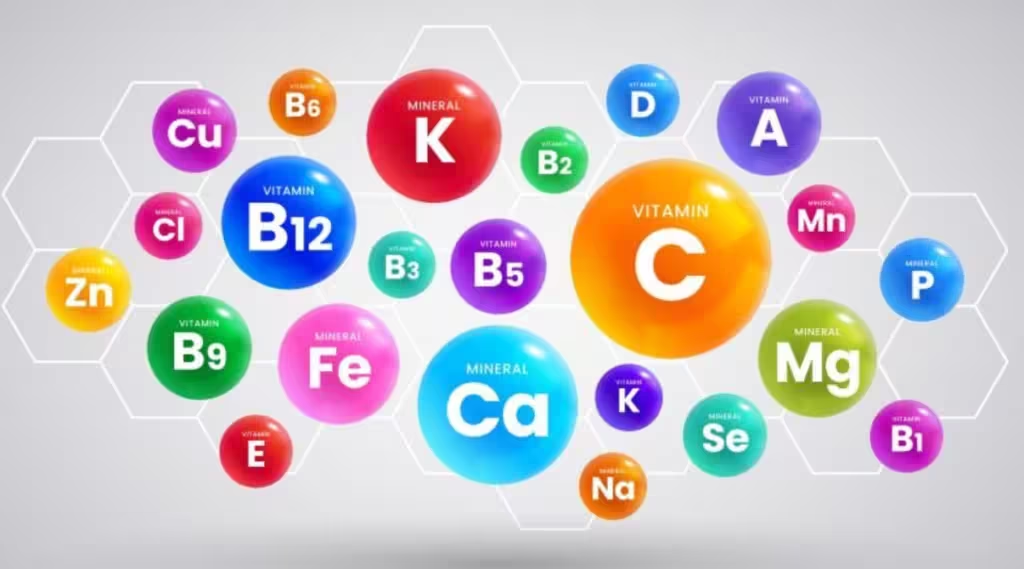Vitamins and minerals are essential nutrients that the body requires in small amounts to function correctly. Deficiencies in these nutrients can lead to a variety of health issues. This overview details common vitamin and mineral deficiencies, their causes, symptoms, management, and the importance of addressing them promptly.

Vitamin Deficiencies
- Vitamin B12 (Cobalamin) Deficiency
- Causes: Pernicious anaemia, long-term use of proton pump inhibitors, vegetarian or vegan diets lacking in B12, gastrointestinal disorders affecting absorption (e.g., Crohn’s disease).
- Symptoms: Fatigue, pallor, glossitis (inflamed tongue), neurological symptoms such as numbness, tingling in hands and feet, memory disturbances, and difficulty walking.
- Importance: Essential for red blood cell formation, neurological function, and DNA synthesis. Prolonged deficiency can lead to irreversible neurological damage.
- Disease Conditions: Pernicious anaemia, megaloblastic anaemia, neurological disorders (e.g., neuropathy), cognitive impairments.
- Management:
- Food Sources: Meat, fish, dairy products, eggs, fortified cereals.
- Supplementation: Oral B12 supplements or injections for severe cases.
- Monitoring: Regular blood tests to monitor B12 levels, especially for individuals at risk.
- Vitamin D Deficiency:
- Causes: Limited sun exposure, dark skin, use of sunscreen, malabsorption syndromes, chronic kidney disease.
- Symptoms: Bone pain, muscle weakness, increased risk of fractures, rickets in children (characterised by soft, weak bones), osteomalacia in adults.
- Importance: Crucial for calcium absorption, bone health, and immune function. Deficiency can lead to bone deformities and increased susceptibility to infections. Vitamin D, often called the sunshine vitamin, plays a crucial role in helping your body absorb calcium from your diet
- Disease Conditions: Rickets in children, osteomalacia in adults, osteoporosis, increased risk of fractures, muscle weakness.
- Management:
- Food Sources: Fatty fish, fortified dairy products, egg yolks.
- Supplementation: Vitamin D3 supplements, especially during winter months or for individuals with limited sun exposure.
- Sun Exposure: Safe sun exposure practices to enhance natural vitamin D synthesis.
- Vitamin C (Ascorbic Acid) Deficiency
- Causes: Poor dietary intake (lack of fruits and vegetables), smoking, alcoholism, malabsorption syndromes.
- Symptoms: Scurvy, which includes symptoms like fatigue, swollen and bleeding gums, joint pain, and poor wound healing.
- Importance: Vital for collagen synthesis, antioxidant protection, and immune function. Deficiency can impair tissue repair and increase vulnerability to infections.
- Disease Conditions: Scurvy, characterised by fatigue, swollen and bleeding gums, joint pain, and poor wound healing.
- Management:
- Food Sources: Citrus fruits, strawberries, bell peppers, broccoli, tomatoes.
- Supplementation: Vitamin C supplements if dietary intake is insufficient.
- Vitamin A Deficiency
- Causes: Poor dietary intake, malabsorption syndromes, liver disorders.
- Symptoms: Night blindness, dry eyes, increased susceptibility to infections, skin issues.
- Importance: Essential for vision, immune function, and skin health. Deficiency can lead to severe visual impairments and increased morbidity from infections.
- Disease Conditions: Night blindness, xerophthalmia (dry eyes), increased susceptibility to infections, impaired immune function, skin issues, severe visual impairments.
- Management:
- Food Sources: Liver, fish, fortified dairy products, orange and yellow vegetables (e.g., carrots, sweet potatoes).
- Supplementation: Vitamin A supplements for individuals with confirmed deficiency.
- Vitamin K Deficiency
- Causes: Long-term use of antibiotics, malabsorption syndromes, liver disease.
- Symptoms: Increased bleeding and bruising, prolonged clotting times.
- Importance: Critical for blood clotting and bone health. Deficiency can lead to severe bleeding disorders.
- Disease Conditions: Increased bleeding and bruising, prolonged clotting times, haemorrhagic disease of the newborn, osteoporosis.
- Management:
- Food Sources: Green leafy vegetables (e.g., spinach, kale), broccoli, Brussels sprouts.
- Supplementation: Vitamin K supplements or injections in severe cases.
- Monitoring: Regular monitoring of blood clotting times in individuals at risk.
Mineral Deficiencies
- Iron Deficiency
- Causes: Chronic blood loss (e.g., heavy menstruation, gastrointestinal bleeding), inadequate dietary intake, malabsorption, pregnancy.
- Symptoms: Fatigue, pallor, shortness of breath, spoon-shaped nails, pica (craving for non-nutritive substances like ice or clay).
- Importance: Vital for haemoglobin production and oxygen transport. Deficiency can lead to anaemia, impairing physical and cognitive performance.
- Disease Conditions: Iron-deficiency anaemia, characterised by fatigue, pallor, shortness of breath, impaired cognitive and physical performance.
- Management:
- Food Sources: Red meat, poultry, fish, lentils, beans, fortified cereals.
- Supplementation: Oral iron supplements or intravenous iron in severe cases.
- Monitoring: Regular blood tests to monitor haemoglobin and ferritin levels.
- Calcium Deficiency
- Causes: Inadequate dietary intake, vitamin D deficiency, hypoparathyroidism, chronic kidney disease.
- Symptoms: Numbness and tingling in fingers, muscle cramps, tetany (muscle spasms), osteoporosis, increased risk of fractures.
- Importance: Essential for bone health, muscle function, and nerve transmission. Deficiency can lead to weakened bones and increased fracture risk.
- Disease Conditions: Osteoporosis, osteopenia, rickets in children, muscle cramps, tetany (muscle spasms), increased risk of fractures.
- Management:
- Food Sources: Dairy products (milk, cheese, yoghurt), fortified plant-based milks, leafy green vegetables, almonds.
- Supplementation: Calcium supplements, often combined with vitamin D to enhance absorption.
- Monitoring: Regular bone density scans and blood tests to monitor calcium levels.
- Magnesium Deficiency
- Causes: Chronic alcoholism, malabsorption, prolonged use of diuretics, certain medications.
- Symptoms: Muscle weakness, tremors, seizures, arrhythmias, fatigue.
- Importance: Important for muscle and nerve function, blood glucose control, and bone health. Deficiency can lead to severe neuromuscular and cardiovascular issues.
- Disease Conditions: Hypomagnesaemia, muscle weakness, tremors, seizures, cardiac arrhythmias, hypertension, metabolic syndrome.
- Management:
- Food Sources: Nuts, seeds, whole grains, leafy green vegetables.
- Supplementation: Magnesium supplements, typically in the form of magnesium oxide or magnesium citrate.
- Monitoring: Regular monitoring of magnesium levels, particularly in individuals with chronic conditions.
- Zinc Deficiency
- Causes: Poor dietary intake, malabsorption syndromes, chronic liver or kidney disease.
- Symptoms: Impaired immune function, hair loss, diarrhoea, delayed wound healing, skin rashes.
- Importance: Crucial for immune function, wound healing, DNA synthesis, and cell division. Deficiency can increase susceptibility to infections and impair growth and development.
- Disease Conditions: Impaired immune function, hair loss, diarrhoea, delayed wound healing, skin rashes, growth retardation in children.
- Management:
- Food Sources: Meat, shellfish, legumes, seeds, nuts, dairy products.
- Supplementation: Zinc supplements, especially during periods of increased need or confirmed deficiency.
- Monitoring: Regular assessment of zinc levels and dietary intake.
- Iodine Deficiency
- Causes: Inadequate dietary intake, areas with iodine-deficient soils, certain goitrogenic foods.
- Symptoms: Goitre (enlarged thyroid gland), hypothyroidism, cognitive impairments in children.
- Importance: Essential for thyroid hormone production which regulate metabolism. Deficiency can lead to thyroid disorders and developmental issues.
- Disease Conditions: Goitre, hypothyroidism, cretinism in infants (severe cognitive impairment and developmental delays), impaired cognitive function.
- Management:
- Food Sources: Iodised salt, dairy products, seafood, seaweed.
- Supplementation: Iodine supplements or use of iodised salt.
- Monitoring: Regular thyroid function tests to monitor the effects of iodine supplementation.
